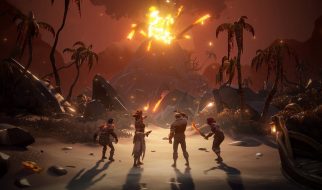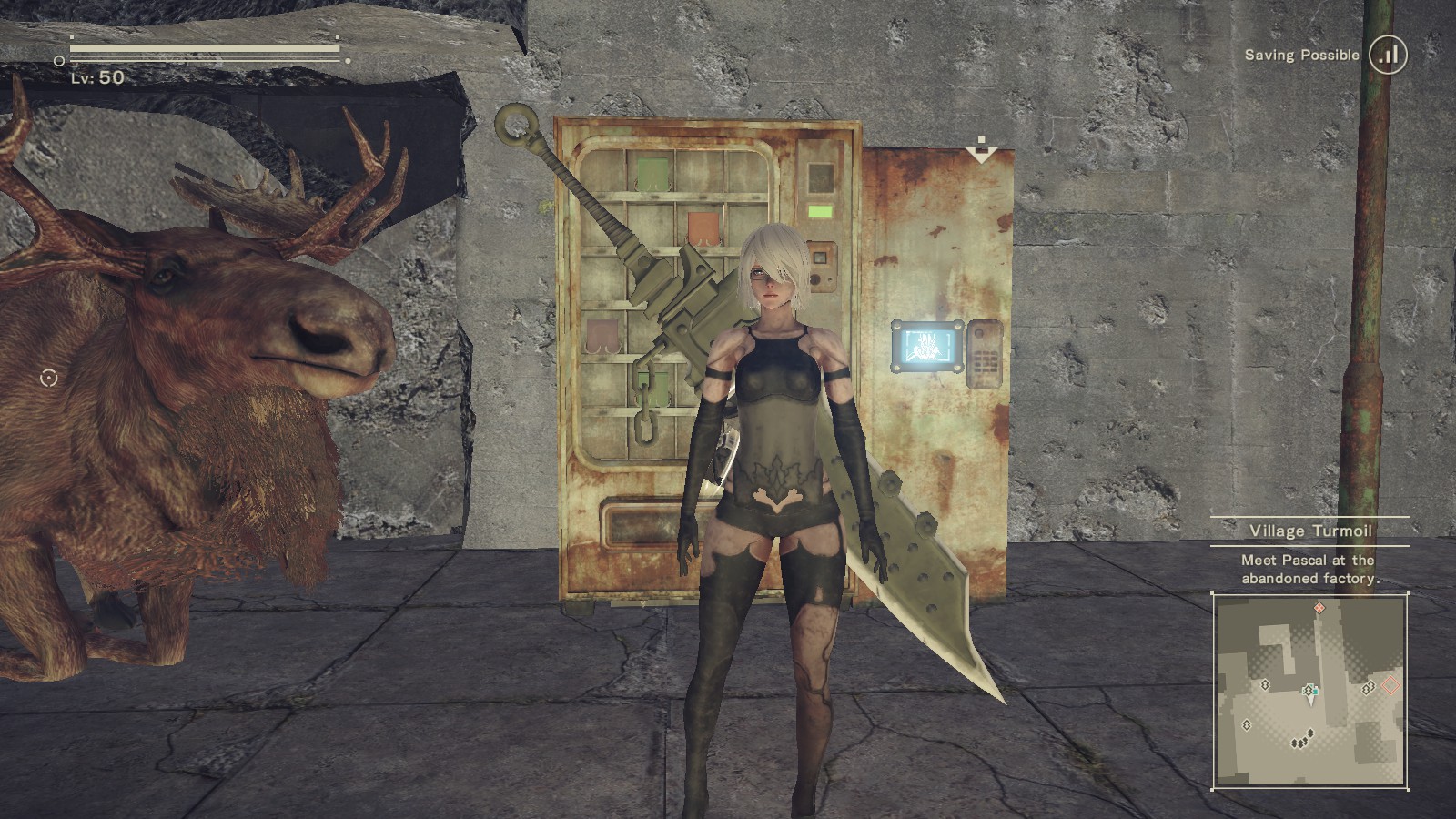
(Warning: This article spoils most of NieR:Automata, and a hearty part of the original NieR to boot)
NieR:Automata is the worst game of the year, and I doubt that very many people share that opinion. I don?t know what your critical landscape is like, but judging from my social media feeds the internet has had almost nothing but praise for the Square Enix/PlatinumGames-developed NieR:Automata, both at the time of its release and once again as we enter Game of the Year season. Throughout the year, I?ve been hard-pressed to find anyone beyond a handful of friends who thought this game was anything short of a heart-wrenching masterpiece, with the one exception of the Video Game Hell podcast, who capture most of my initial feelings about the game at launch.
Aside from a single podcast, the nearest thing approaching criticism of NieR:Automata I ever saw were tweets rebutting the idea that the game was ?too horny,? a perception that I think comes more from a subgroup of the game?s fans (and, to be fair, the game?s director), than anything in Automata itself.
Personally, I don?t think that NieR:Automata is a horny game. I think it is the worst game of 2017. Its critical reception doesn?t make me eager to put that take out in public, but at the same time, I feel compelled to. I don?t think I?ll change anybody?s mind by writing this, but I do think that if I let the year pass by without putting any of my issues with this game on paper, I?ll regret it. With all that preamble out of the way, let the take officially commence. I promise that?s the last you?ll ever hear about 2B?s butt.
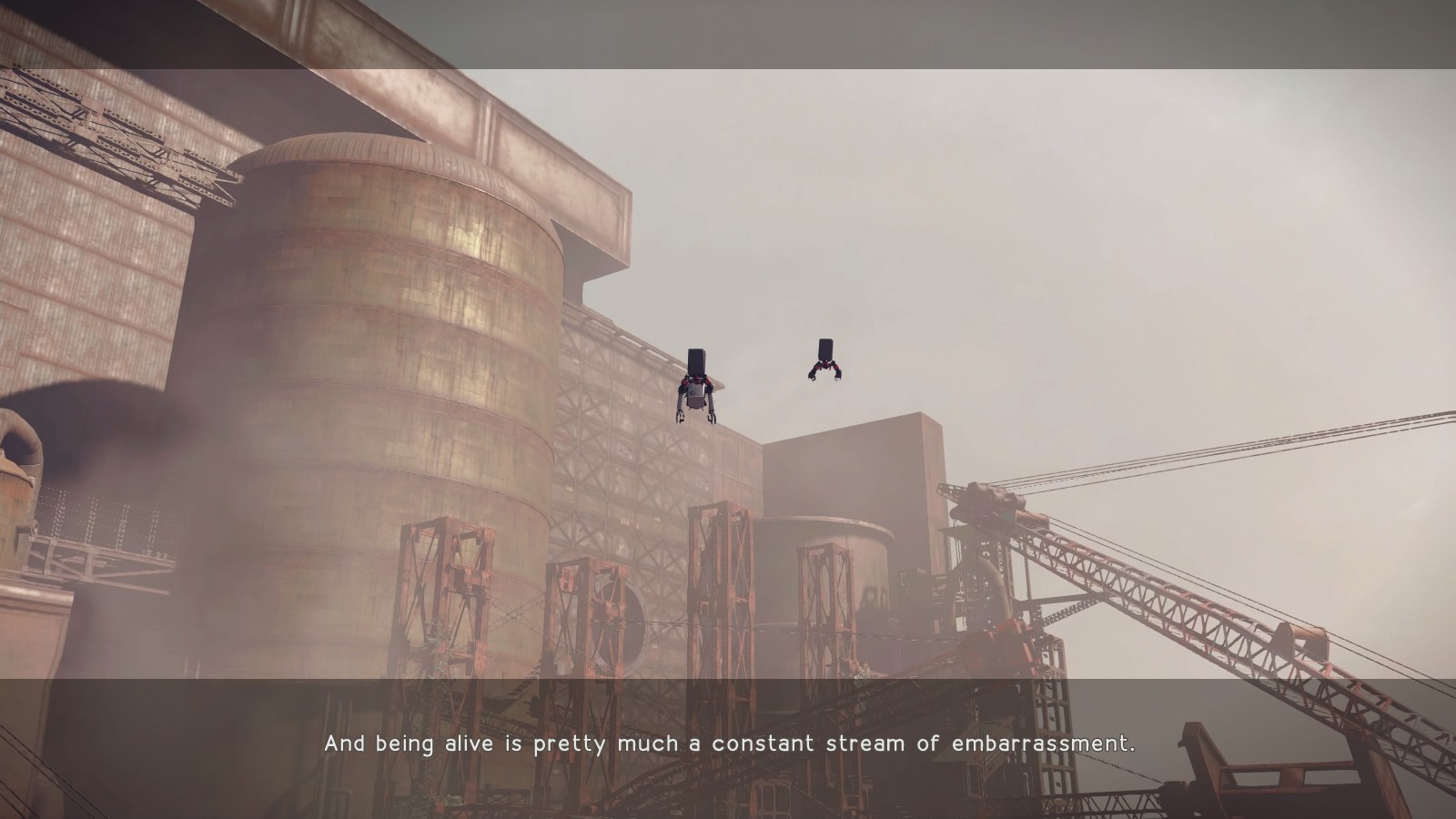
NieR:Automata is not the worst game of the year because there?s nothing to like about it. In fact, there are a lot of things in this game I genuinely enjoy. There?s a cast of cool robots, many of whom are lesbians, which I?m already very into as a gay robot myself. There?s stellar music that really punctuates the haunted, melancholy vibe of some of the game?s areas, both things I like in general and specifically wanted to see again after the original NieR. There?s themes of existentialism, of society and how society is created and recreated, and how nonhuman beings would understand personhood when their only frame of reference for such a thing is human. All of these are things I?m very much into, and the reasons that I bought NieR:Automata the second it came out on PC even though I had planned to get a PS4 just a few months later.
The problem is, these things that I like aren?t the elements of NieR:Automata that really matter. Halfway through, the game tips its hand. Automata has one thing it cares about more than anything else, and it starts tossing out every other part of itself in pursuit of its goal. Characters die left and right, themes are hastily wrapped up or abandoned altogether, the pacing stutters and grinds to a half, and the storytelling nosedives. All in pursuit of the one thing NieR:Automata cares about more than anything else: tragedy.
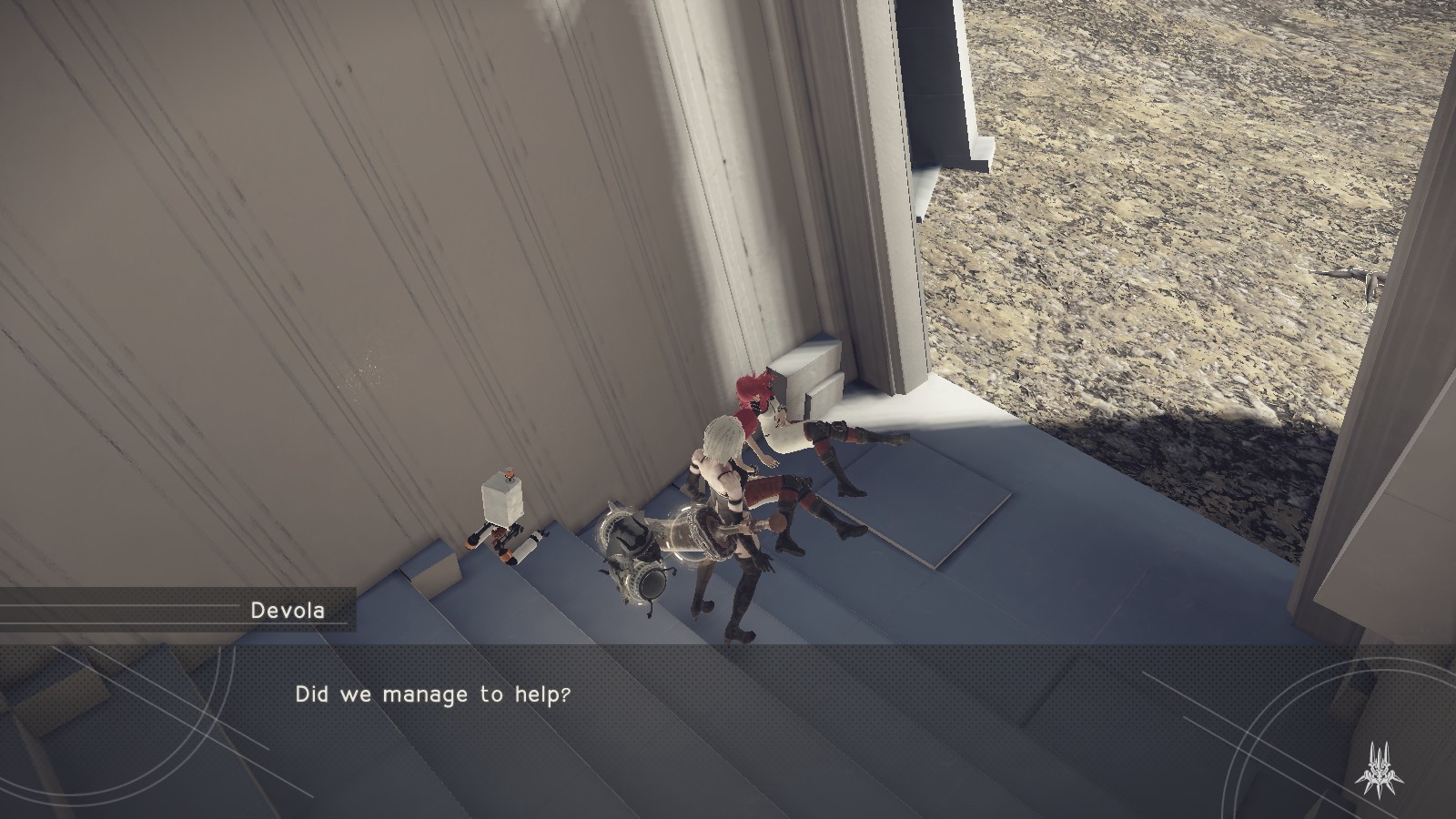
This is a game that is trying very, very hard to upset its player. NieR:Automata doesn?t just want you to feel sad, it wants you to despair. This is the kind of game that starts with a post-apocalyptic setting and introduces another apocalypse halfway through. But NieR:Automata is so busy tripping over itself to try and bum you out that it can?t be bothered to do it right. The tragedy in Automata is predictable and fake, turning to cheap character death and convenient plot turns so often I began to exclusively question the story rather than engage with it. Really? I asked the game over and over again. This is the story you decided to tell? And it was a bitter question because of how much promise the game had shown me at first, how excited I was starting the download, and how disinterested it left me in the end. That?s why NieR:Automata is the worst game of the year.
Let?s step back a bit to establish what this game is before we talk about what it becomes. NieR:Automata is, at first, the story of a war-torn Earth far, far in the future. Aliens have sent an autonomous force of machine soldiers to Earth as a precursor to their invasion of the planet. The surviving remnants of Mankind fight back through an organization of androids named ?YoRHa,? having retreated to a shelter on the Moon. You play as a pair of YoRHa androids, the taciturn and professional 2B and her younger, more naive partner 9S, who hack and slash their way through battle after battle as new facts about the fight are revealed, and long-term plans come to fruition, eventually bringing the conflict to its final conclusion.
Let?s not entertain this setup for too long: the twists in NieR:Automata start coming pretty early. First it turns out that Aliens are dead, having perished soon after arriving on Earth. The machines continue to fight without masters because the network that controls them doesn?t need oversight to continue its work. The humans are also long dead, and their supposed secret base on the moon is just a data server and a story used to keep the YoRHa androids fighting. The whole war is pointless, and has been for centuries: no matter who wins, there is nobody left alive to claim Earth when the dust settles.
All these twists are NieR:Automata?s favorite tactic to make you sad. You thought those were just mindless enemy machines, but it turns out they have feelings, you bastard! We told you the world was set up this way, but it?s actually set up this second, much sadder way! You thought you were helping this character, but you were actually making everything worse! You thought this character was going to survive, but actually, they die! Do you feel sad yet? Most of Automata?s twists are totally predictable (At this point it would probably be more surprising if the machines didn?t have feelings), and they get old really quick. It?s shocking the first time Automata kills off a huge group of characters at once, but the second it starts trying to get you emotionally invested in a new group, you know what?s coming a mile off. The story becomes so obvious and artificial that you detach from it, because the game?s killed off nearly everyone or everything you?d otherwise care about.
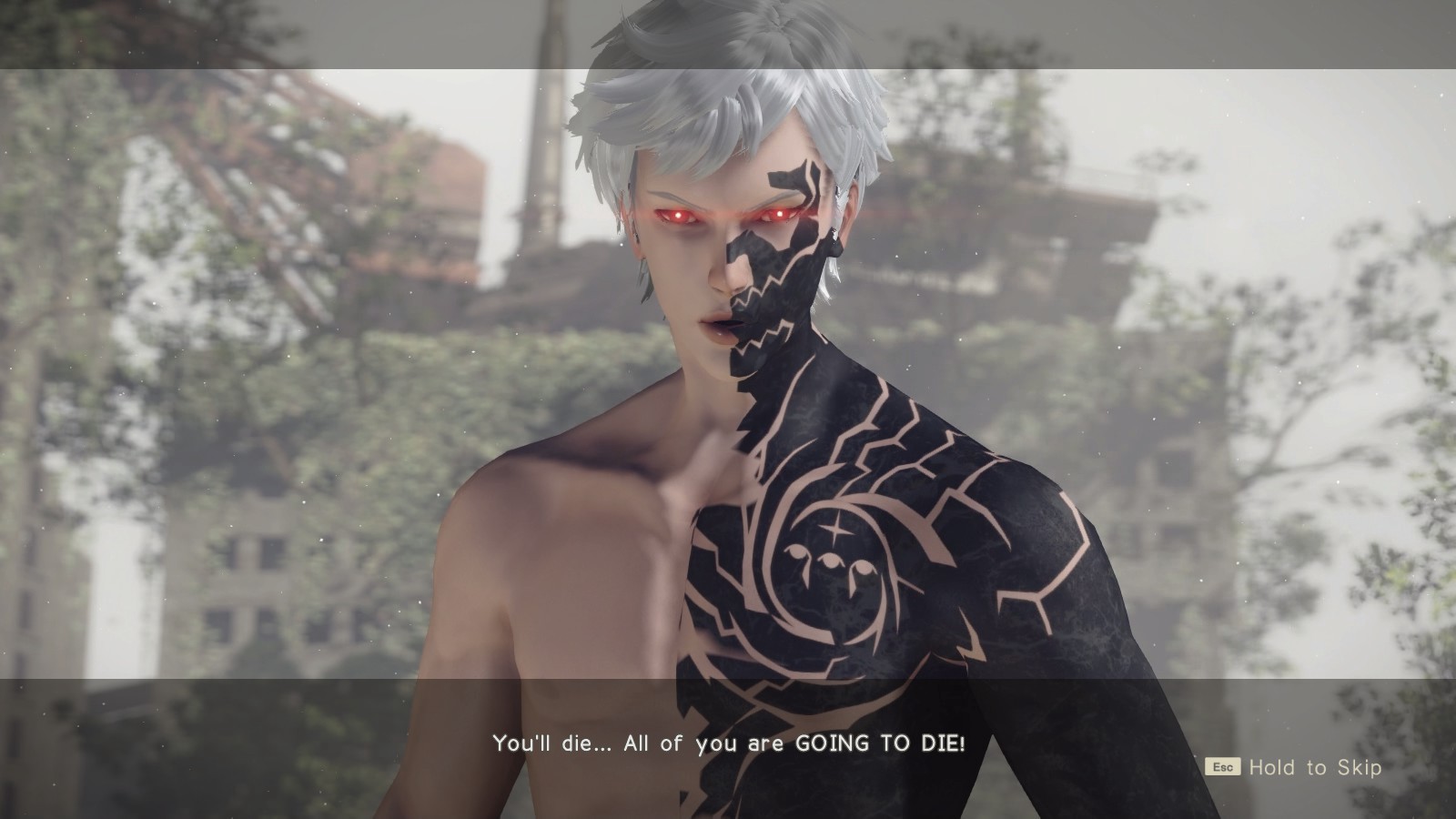
NieR:Automata?s biggest twist, and where it hurts itself the most, is the one where 2B dies. Halfway through the game, after the beginning of its third Route, C, a failed attack on the machines ends with a logic virus that infects most of the YoRHa androids and turns the machine network berserk. In the chaos, 2B and 9S are separated and she becomes infected with the logic virus. Before it can fully take over her systems, 2B encounters A2, a rouge prototype android completely separate from YoRHa, and asks for a mercy kill, transferring her memories and mission data into her sword so that A2 can take over her role in the story.
Funnily enough, this is the one twist you?re least likely to see coming. Everything about NieR:Automata leads you believe that 2B the main character among the trinity of playable androids. 2B is the character in focus on the covers of the game, in one version holding a limp 9S in a princess carry. She?s the one in all the demos and screenshots, the first character you play as in the entire game. She even has a little bit of visual continuity with Yonah, an important character in the original NieR, for that added implication of importance. In the game itself, a series of preview videos shown at the end of Route B imply there?s a lot of 2B-featuring story to come, so her death about half an hour into Route C comes as a genuine shock.
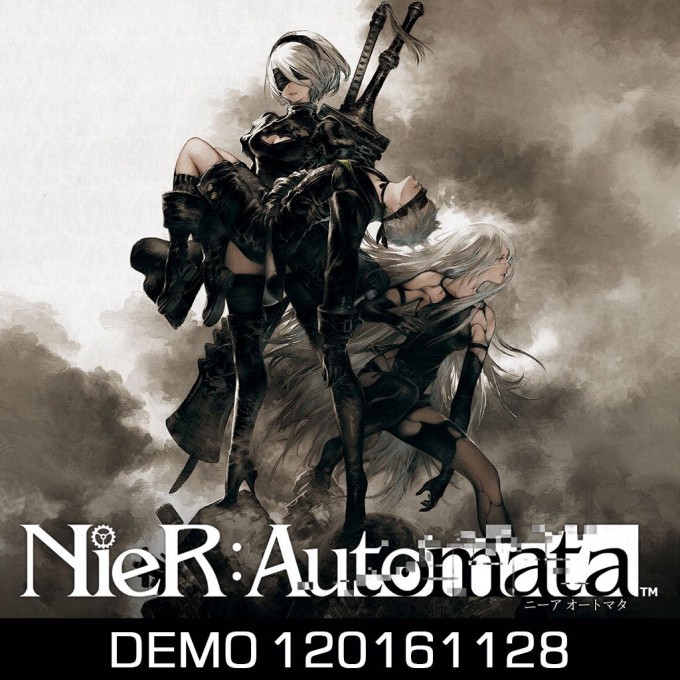
The death of 2B may be one of the more effective twists in NieR:Automata, but it?s also the start of its downward descent. The thirty-minute sequence of the failed attack, destruction of YoRHa, and 2B?s death is the point where Automata tips its hand. By this point, you know exactly what kind of game this is going to be, and what it does, and doesn?t, care about, namely 9S and 2B.
I?ve said before that NieR:Automata has a tendency to discard some of its own elements in favor of others. Nowhere is this tendency more obvious than in the relationship between 2B and 9S. Starting with their mirrored Routes A and B, the game establishes a dynamic where 2B is used to enhance 9S?s story. In these routes, 2B is the good soldier who follows orders and kills machines without thinking too hard about it. 9S is the investigator, the questioner, who still fights as ordered but who also discovers important truths about the machines he?s fighting and the world they inhabit. 2B?s route exists so that 9S?s route can retread its events and build on it, and once that role is fulfilled, 2B is killed off as the primary motivation for the the revenge rampage that is 9S?s story in the second half of the game. Later, 2B literally becomes spare parts for 9S, as he grafts an arm from one of her bodies onto his own so that he can keep killing machines. The climax of the game reveals that the purpose of 2B?s entire existence was to watch over 9S and kill him if he ever figured out what actually happened to humanity, because it turns out that 9S is just such a special smart boy that he keeps figuring out the centuries-old conspiracy no matter how many times they reset him. It is no exaggeration to say that on every level possible, 2B exists in this story for the sake of 9S.
So if you were one of those players who liked 2B, maybe for her design, her fighting style, the gay vibes of her relationship with her operator 6O, or her no-emotions-allowed personality, and the way the facade cracks almost instantly whenever time something bad happens to someone she cares about, then tough luck, I guess. She?s just one of the many, many NieR:Automata characters that exist to get killed for tragedy. This, for reference, is almost every character in the game, including all the other YoRHa operators, fighters, and commander, Anemone and the Resistance androids on Earth, Pascal and almost every member of the different machine communities, both hostile and friendly. In the absolute best ending of NieR:Automata, about five characters survive. In one of the endings, it?s as low as one. Everyone else dies for the sake of the tragedy.
When I look at NieR:Automata?s cast, and take notice of which characters are considered disposable and which can survive, things start to stand out to me. I notice how, in a playable cast of two women and one man, the first woman is killed off and replaced by the second woman, who in the endings of the game either sacrifices herself to save the one man?s life, or is killed by him. I notice the other women in this majority-female cast who are either killed for or by the one playable man. I don?t know the reasons that led to these decisions, but the results speak for themselves: a game that wastes its opening by settling on one of the most been-there-done-that stories in fiction: the revenge rampage fueled by dead women, perpetrated by the only playable man in the game.
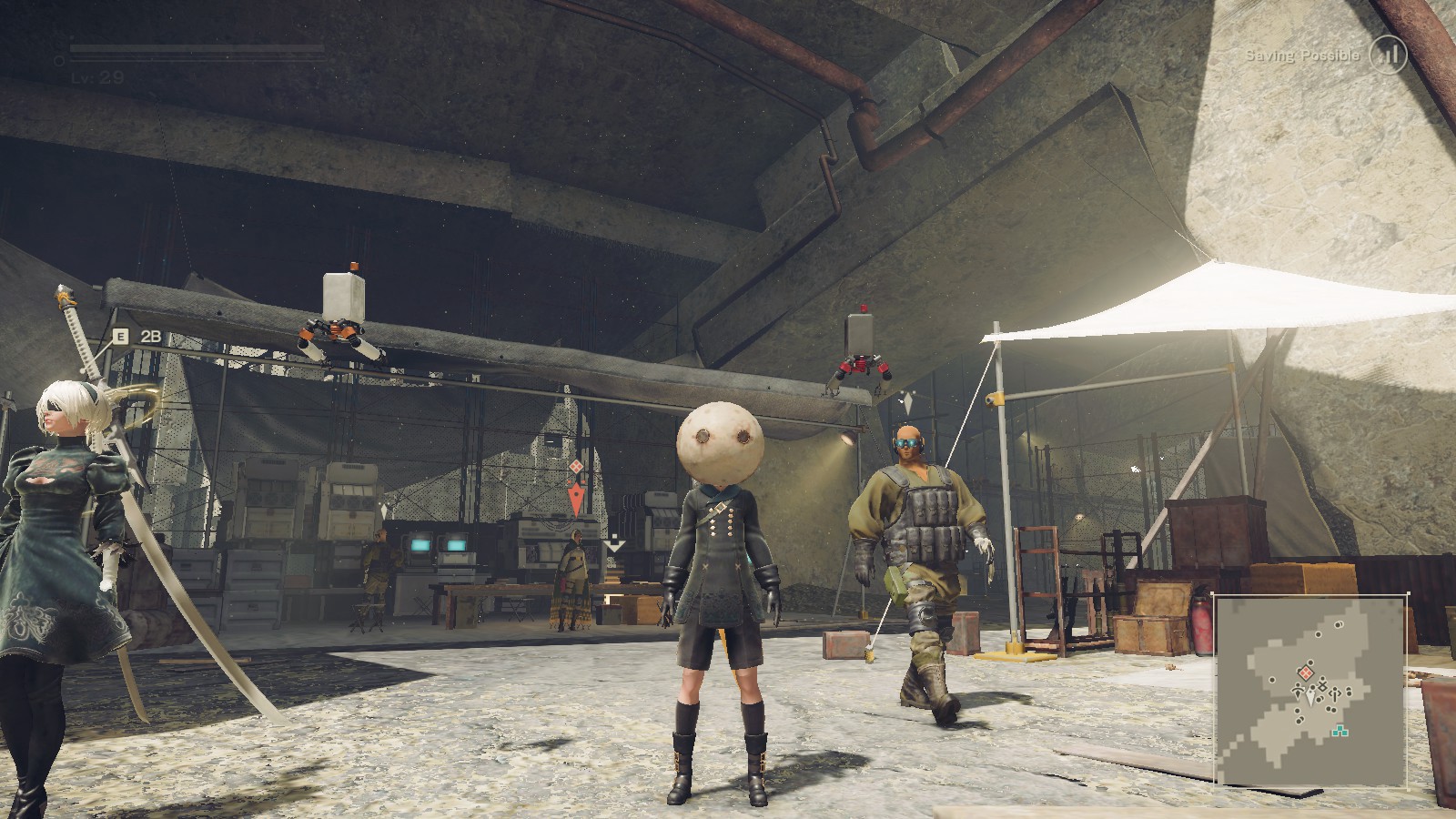
I really can?t overstate how completely tired, unsatisfying, and ineffective the later half of 9S? story is. Before the two-part revenge quest even begins, we as players know both parts are completely pointless. 9S has sworn vengeance against the machines and A2, but killing either would change nothing about the world. We know that one android has no hope against a planet-wide network of machines, and we know that the vendetta against A2 wouldn?t exist if our boy protagonist had just arrived on the scene 30 seconds earlier, or hadn?t twice been conveniently whisked away from A2 before he could learn the full story of what happened between her and 2B. To add insult to injury, the method of separating 9S and A2 is the same both times. You can almost feel the author?s hands at work, breaking his own story as he tries to get it to line up just right.
The execution is even worse than the setup. 9S? revenge quest consists mostly of him wandering over to three giant gray boxes that have appeared in the world, going inside, and killing a bunch of machines while dealing with a gimmick or two, all the while descending further and further into ~insanity~ as conceptualized by the man who wrote Drakengard. I would guess that the complete unpleasantness and futility of this sequence is designed to inspire that valued despair, but it completely fails at its objective. It?s not tragic to have to play through four hours of a character making stupid, pointless decisions, while he tries his best not to talk to anyone and women die left and right so he can keep going and have things to be mad and sad about. It?s awful storytelling, made even worse by the fact that the original NieR already did it so much better.
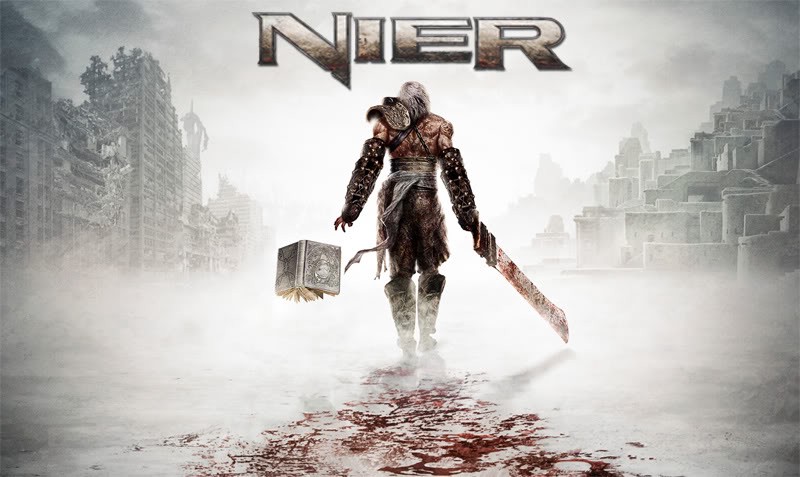
The back half of 2010?s NieR was also a revenge story. After an overwhelming, mysterious villain kidnaps his sister/daughter (depending on the country you buy the game in, the titular Nier is either a father or an older brother), Nier pledges to do anything necessary to get her back. The story starts with a familiar narrative we?re taught to see positively, of a guy who?ll do anything to save his family, which is slowly picked apart by the game over time. We see how Nier?s quest brings ruins to the places he visits. as well as both the people who get in his way or help him alike. Eventually, we learn that the future of humanity is in jeopardy, and that Nier?s quest will push the entire species over the brink (There is a lot going on in the original NieR that I don?t have time to explain here, I urge you to check it out if you don?t already know it).
The reason for the tragedy in the original NieR is primarily Nier?s own character. He?s been stuck in a survival mindset for so long, willing to sacrifice anything for the sake of his family, that he doesn?t realize and then doesn?t care that he?s sacrificing everything for everyone, dooming even the very girl he was trying to save in the first place.
The game shows that wanting to save your sister or daughter is not a cause worth murdering hundreds of other beings for, and no happy ending ever comes of that kind of slaughter. The best thing Nier can do is sacrifice himself, being deleted from the world (and your PS3, in a metatextual move that NieR:Automata will later jack for its own final ending), so that his family and friends can at least live the rest of their lives out in peace. In a period where gaming was particularly filled with gritty men killing thousands in the name of women, the original NieR was a memorable counterpoint to those kinds of narratives.
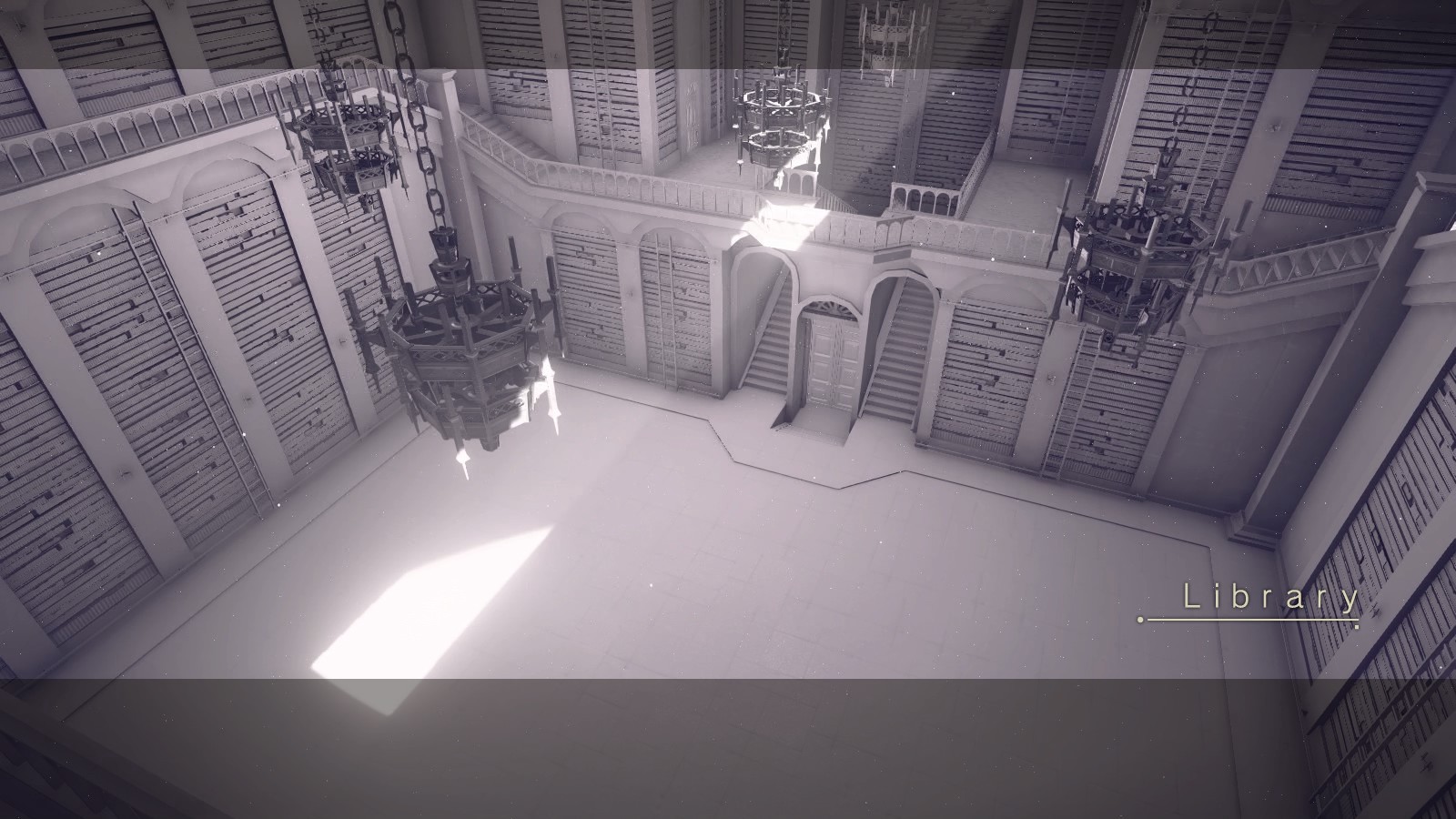
Seven years later, NieR:Automata makes its predecessor look like a fluke. There?s no subversion, no critique, not even catharsis in the 9S story that takes up so much of its run time. If anything, the game seems incredibly fixated on favoring him over every other character in the game. He gets unlimited reign to rage and cry and freak out while A2 has to suck up her pain after one boss fight and start take over the investigative and personal role he?s too good for now, and again, either die to save him or just get killed by him. The focus on 9S is just baffling considering all the other, much better stories that in the game that get cut off for his sake.
And there were so many other, more interesting stories in NieR:Automata that never got a chance to breathe. What about 2B, and her hinted but completely lacking interiority? What about, god help me, the clear attachment she had developed to 9S, despite literally being created to serve as his executioner? What about A2?s revenge story, her history with Anemone, or her reluctant friendship with Pascal? What about Pascal himself, and his endearing little village of communist machines? What about Adam and Eve, who get this all this initial focus just to ultimately be no more important than any of the other machine bosses in the game? This was the meat of the game, where all the cool themes and story beats were, and NieR:Automata just did not care, and chucked it all away. There?s a lot of things I could call that decision. ?Stupid? is one I just couldn?t resist, but more than anything else, the word I have to use is ?Disappointing.?
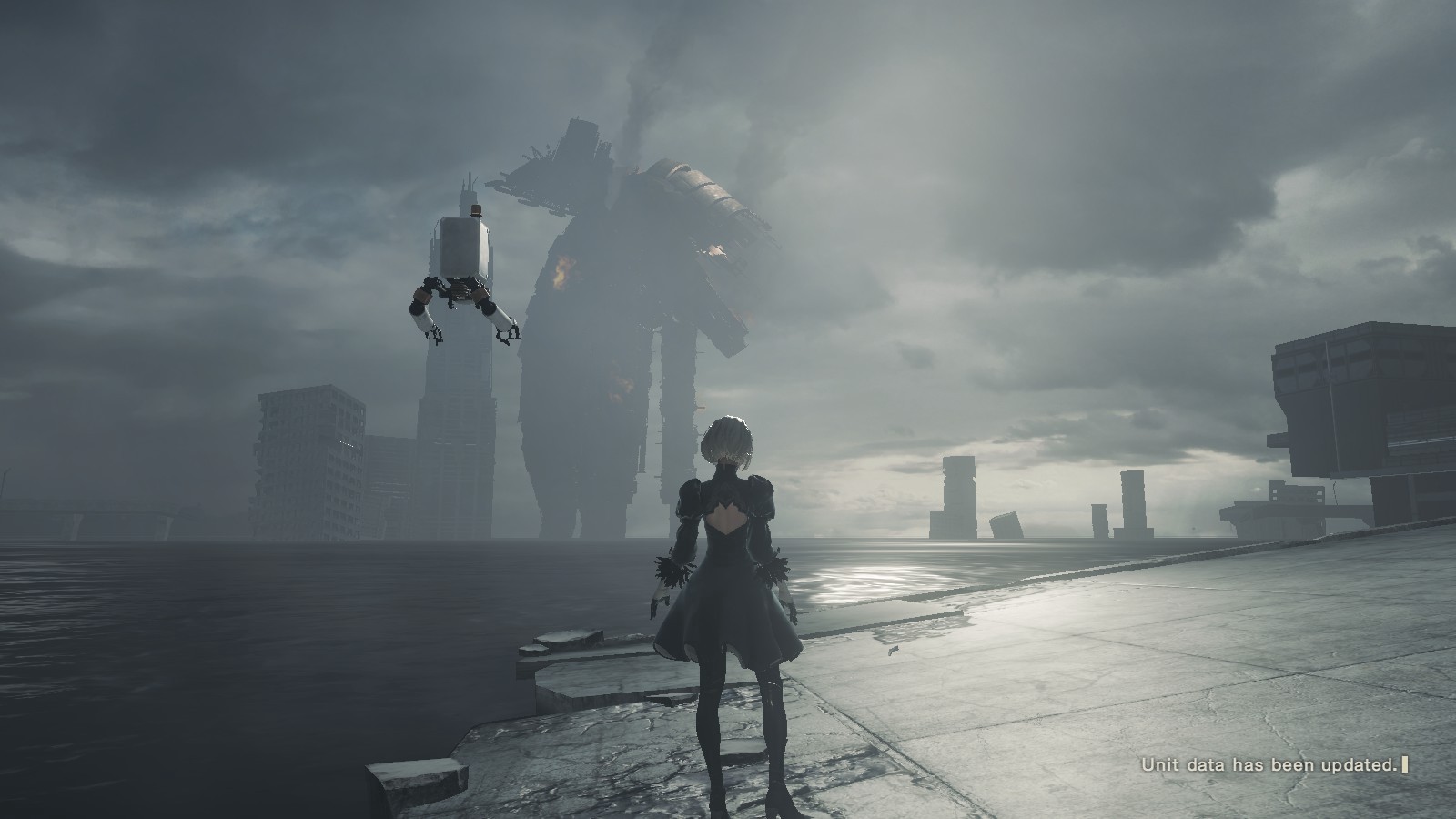
?Worst Game of the Year? is a designation that comes with some qualifications. Naturally, it?s a judgement based on my personal experience with the games I played this year. There were probably games that came out this year that I would?ve liked less than Automata, but I didn?t play those games, whether because of coincidence, limited resources, or because I heard bad things about the game and decided it wasn?t worth checking out. When it comes to Worst (or Best) Game of the Year, I have to work with what I have. I?m not capable of judging games I haven?t played beyond saying whether or not they sound like things I would enjoy.
The second qualification is that a game has to be a specific kind of bad to get the distinction of Worst. For example, I played Alan Wake this year. I bounced off it after about three hours, finding nothing about it really interesting or worth the time. I put a video of the rest of the cutscenes on in the background while I did some schoolwork only because I have to see how things end. At this point I?ve forgotten most of what happens. Alan Wake is a pretty bad game, but I don?t really care. I bought it for a pittance (possibly for free? I honestly don?t remember), played it for an afternoon, and moved on. It was bad, but it was the same kind of bad that blueberries occasionally are. I eat it, scowl at the taste, but then I eat another blueberry and move on.
To be the Worst Game of the Year, a game has to be the kind of bad that sticks with me. It has to get under my skin and really, lastingly affect me with how bad it is. I have to think about the Worst Game of the Year for months after I play it. I have to care, enough to write a five-page article about it, or at the very least to still be disappointed with it even though I haven?t touched it since, let?s say, March.
NieR:Automata is that kind of bad, again, not because there?s nothing about it that I like, or even one thing that I really hate, but specifically because it gets so fixated on this awful story that it actively destroys everything that drew me in in the first place. And this is without even once mentioning all the more technical issues, including a totally abysmal lack of controller functionality, and combat that would be a slog even if I could probably move my damn character. But whatever, I can forgive bad controls, or bad design, under some circumstances. It?s a bad story that really lets me down, and it?s NieR:Automata?s truly failed story that earns it the title of Worst Game of the Year.
![NieR:Automata: the [W]orst game of the year](https://911weknow.com/wp-content/uploads/2020/09/nierautomata-the-worst-game-of-the-year-628x275.jpeg)

